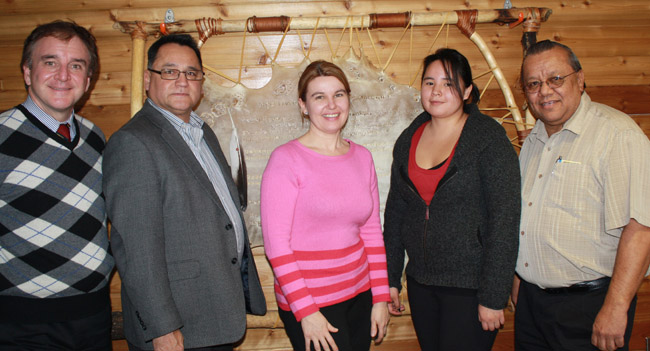Director aims to make the invisible, visible

By Marci Becking
NIPISSING FN – Andree Cazabon knows that her films are not always easy to watch.
But the determined director with roots in Sturgeon Falls stubbornly pursues her mission to educate everyday Canadians about conditions in First Nations like Kitchenuhmaykoosib Inninuwug, a First nation located 600 kilometres northeast of Thunder Bay.
“It makes the invisible, visible,” says Cazabon. “The first time I went to K.I. I experienced culture shock. I couldn’t believe this was my country.
“We’re trying to get it in the hands of everyday Canadians,” says Cazabon who produced “Third World Canada” about three suicides that leaves eight siblings orphaned in a community struggling with living conditions most Canadians would find deplorable.
“We need social workers, administrators, public servants – we need people to understand that communities like K.I. exist. I hope that one day, First Nations issues will be common family dialogue.”
Cazabon and KI youth resident Faith McKay were touring Nipissing region to screen the film and talk upcoming projects.
McKay, 25, recounts the tour stop in M’Chigeeng First Nation on Manitoulin Island, where 300 community members came out to see the film.
“It was overwhelming for me to stand in front of that many people and tell them my story,” says McKay who hopes someday to become a journalist and tell other people’s stories. “My story goes from sadness to hope. At one point I wanted to end my life and now I’m telling everyone my story all over the place.”
“Third World Canada” is the fifth of Cazabon’s films, which have been collectively viewed by over a million people. It touches on the power of change, transforming people and the resilience of youth. Free screenings were shown at Nipissing University on Jan. 21, followed by panel discussions in which audience member s were asked their reaction to what they had seen. Responses ranged from “hopelessness” to “anger”.
Cazabon helped McKay, along with K.I. youth Justin Beardy, Leona Matthews and Karyn Paishk organize last June’s reconciliation exchange in which 43 Canadians travelled to K.I for a truly authentic First Nation experience.
“Our guests were overwhelmed with the generosity of the community,” says Cazabon. “Many of them before they came up asked what they could bring as gifts to their host families. My response to them was instead of giving money, just learn.”
McKay hopes that there will be a similar exchange happening again this summer.
“The youth are in the beginning planning stages, but we’d like people to come in August. There will be more community events during the week with the annual homecoming and it will also be warmer to swim.”
Cazabon’s memories of K.I. are not all grim.
“Now when I’m not there, I miss the community. They are a family to me. I asked my daughter where she wanted to go – Disney or K.I. and she chose K.I.”
For more information on the Third World Canada tour, visit the Third World Canada page on Facebook.


